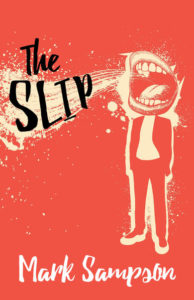May 25, 2017
The Slip, by Mark Sampson
 It was a very interesting moment in which to be reading Mark Sampson’s new novel, The Slip, the week after a thoughtless editorial on cultural appropriation led to an idiotic conversation on Twitter, and then the inevitable response referring to lynch-mobs and and witch hunts. In The Slip, Sampson wades into this conversation about outrage and p.c. culture, but with unfathomable thoughtfulness and nuance, and also manages to be hilarious to boot.
It was a very interesting moment in which to be reading Mark Sampson’s new novel, The Slip, the week after a thoughtless editorial on cultural appropriation led to an idiotic conversation on Twitter, and then the inevitable response referring to lynch-mobs and and witch hunts. In The Slip, Sampson wades into this conversation about outrage and p.c. culture, but with unfathomable thoughtfulness and nuance, and also manages to be hilarious to boot.
But it will take a chapter or two. I have a personal gauge for a narrative voice I’m willing to tolerate, in fiction and non, and if the word “sclerotic” is in your lexicon, you’ve basically lost me. The voice of Sampson’s narrator, absent-minded professor and public intellectual Dr. Philip Sharpe, therefore, requires some patience on the part of the reader, to be willing to entertain his allusions and extensive vocabulary. To come to understand that “entertain” is the very point: this is satire and very very funny. Don’t bother getting your dictionary out, unless you really want to increase your word power—to worry about this is to get bogged down in the details, and I’d advise you instead to lose yourself to the book’s flow.
The situation is this: left-wing intellectual Philip Sharpe says something horrifying in a televised debate with a right-wing pundit who is a woman, and I promise you you will probably gasp on page 37 just like I did. Outrage ensues, a social media furor, angry editorials, student walk-outs, etc. What caused Philip to say what he did? Well, his mind was caught up in domestic troubles, and there’s the fact that try as he might he cannot secure his poppy—the book is set in early November and to appear poppy-less on television is a national crime. And so he’s not completely in control of his faculties as his opponent tries to get the better of him. In fact, Philip is so far out of the loop that he doesn’t actually register the remark that he made that’s upset so many people. “I can be a bit oblivious,” he says at one point in the text, and I’ll say. So he cannot begin to fathom why people are so worked up about an inarticulate point he made about Canadian corporate executives in which he’d so shamefully denied the categorical imperative.
Of course, Philip Sharpe can’t fathom a lot of things—social media, for one. Or cell-phones. Or his wife’s state of mind lately, and why she refuses to get a job beyond writing a parenting column bimonthly, and what her lack of contribution means for their enormous mortgage. All of which gives Sampson a lot of space to traverse the misunderstanding between Sharpe’s supposed slip and what he’s actually said. He’s accustomed to being a bit out of sync with the world, although he’s a bit curious about why the outcry is so disproportionate. And to give us a bit of background into his situation and his character, Philip delves into his history between chapters concerned with the immediate scandal. His unconventional childhood, his time at Oxford, his first serious relationship, his years of success in academia, and his unexpected marriage in his early 40s, when he finds himself a stepfather.
The chapters about parenthood are wonderful. “When a child refuses to sleep, it can make your evening feel like it’s trapped inside a very bad prose poem—all jarring transitions and fragmented narrative arcs.” This chapter with the bad bedtime ends with Philip already at the end of his tether, looking at his daughter and asking himself a very philosophical question: “Remind me again, my love—why are you even here?” Which launches into a chapter about his daughter’s birth, a home birth through which his wife insisted on The Indigo Girls’ “Closer to Fine” playing over and over again. The chapter had me in hysterics and ended on the most excellent note, portraying the awful and ecstatic tones of parenthood.
Anyway, it all goes like this, swiftly, swiftly—I read the book in two days. Soon the anti-feminists are reaching out to support Philip, and his stepdaughter is receiving nasty notes on Facebook, and even the barkeep in Philip’s local isn’t bothering to talk to him. And then finally, the revelation. What he said isn’t what he thinks he’s said, and Philip is horrified at what he’s done, what people have been thinking. Which allows the narrative to turn into something beyond satire, into more of a critique as well on outrage culture, and outrage-at-outrage culture. In a way, The Slip is an inverted version of Zoe Whittall’s The Best Kind of People, with its take on rape culture, feminism and MRAs, and the two books are very interesting companions, making similar points in very different ways.
I loved The Slip. Mark Sampson is my friend, and I read his book intending to avoid full-disclosuring by not writing about it at all, but I liked it so much and have so much to say about it that I really couldn’t help it.





